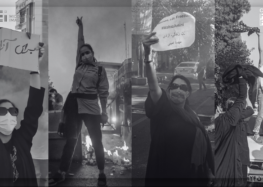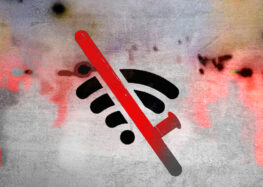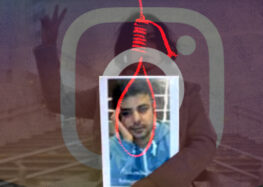Internet Censorship and Filtering
The Internet first became available in Iran in 1993 with the start of dial-up services. Over the next few years, there were no clear guidelines for filtering sites and filtering remained relatively limited, with only intermittent instances of blocking of political or dissident sites, as the authorities did not yet realize the Internet’s potential as a communication tool.
Gradually, however, as use of the Internet began to grow in Iran and authorities began to realize its potential power, the government began to focus more on its censure. During the early years of the reformist Khatami presidency, (1997-2005), there was a relative flourishing of the press. This triggered a backlash by more conservative forces in the government, and the clamping down on print media was met with a corresponding increase in online blogs focused on political and social activism, which alerted authorities to the increasing role of the Internet.
In recognition of the growing role of the Internet, in June 2001, Khamenei decided that the Supreme Cultural Revolution Council, a body of officials originally formed by Ayatollah Khomeini to rule on major social and cultural issues in the country, would be in charge of determining acceptable Internet content, and it issued general guidelines for the Internet that were aimed at stamping out any kind of expression deemed critical of the government or the country’s religious establishment. Gradually, as use of the Internet increased, this Council ordered more systematic filters and blocks on websites, and one year later, in 2002, the Iranian Parliament passed a law that determined guidelines for identifying criminal Internet activities. The Committee to Determine Illegal Websites was formed a year later, laying the institutional and legislative groundwork for the authorities to prosecute individuals for their online activities. For this purpose a branch for Internet affairs was established at the Prosecutor’s Office in Tehran in 2003.
During Khatami’s second term, the filtering of websites and clamping down on bloggers intensified. The arrest in 2003 of the journalist Sina Motalebi for his personal political blog, “Webgard,” and the 2004 “Bloggers Case” in which a group of journalists and bloggers were imprisoned for their online writings, marked a turning point, signaling that the state would focus considerable efforts on the strict censorship of the Internet and prosecute bloggers for online activity deemed transgressive.
With the election of the hardline Ahmadinejad in 2005, restrictions on free speech and access to information intensified, and after the disputed 2009 presidential election and the violent suppression of peaceful protests in its wake, the stamping out of any dissent—particularly in online forums, which had been central to the mobilization and organization of the 2009 protests—became a priority for the government. In August 2006, Ahmadinejad’s administration issued a directive requiring all Internet sites to be registered at the Culture and Islamic Guidance Ministry , and in 2009, the Majlis passed the Computer Crimes Law and established the Working Group to Determine Instances of Criminal Content on the Internet, charged with supervising cyberspace activities, determining sites with “criminal” content, and investigating complaints from the public.
The Working Group declared the following as criminal content, based on Article 21 of the Computer Crimes Law and related articles in the Islamic Punishment Law, the Press Law, and regulations passed by the Supreme National Security Law: content against public chastity and morality; content against sacred Islamic principles; content against public security and welfare; content against government and public officials and agencies; content intended for Internet crimes; content that incites, encourages, or invites people to commit crimes; criminal audio and visual content and copyright issues; and criminal content related to Majlis [the Iranian parliament] elections or presidential elections. These broad and subjective determinations provided authorities with free reign to impose sweeping limitations on permissible Internet content.
The Working Group, under the supervision of the Prosecutor General, thus became the principal, though not exclusive, state body charged with indexing the specific Internet sites to be blocked. The Group has 13 members, including six representing the executive branch and two from the judiciary.
Members of the Working Group to Determine Instances of Criminal Content on the Internet:
- Prosecutor General (head of the group) Minister of Intelligence, or his representative
- Minister of Culture and Islamic Guidance, or his representative
- Minister of Justice, or his representative
- Minister of Telecommunications and Information Technology, or his representative
- Minister of Science, Research and Technology, or his representative
- Minister of Education, or his representative
- Chief of Police
- An information technology expert chosen by the Industries Commission of the Majlis
- A member of the Majlis Justice and Law Commission approved by the Majlis
- Head of the Islamic Propagation Organization
- Head of Islamic Republic of Iran Broadcasting
- A representative from the Supreme Cultural Revolution Council’s secretariat.
The institutional structure of the Group (and indeed of all state bodies charged with formulating Internet policy in Iran) is designed to immunize it from democratic politics. The six members representing the executive branch are a permanent minority; even if all the administration representatives opposed filtering certain a site, they would not be able to defeat a united non-administration faction within the Group.
According to the Computer Crimes Law, members of the Working Group must meet every two weeks to discuss and vote on which Internet sites should be blocked. After determining the sites and applications to be filtered, the list of sites is sent from the Prosecutor General’s Office, to the Telecommunications Company of Iran, the Data Communication Services Company, and other related agencies.
However, decisions regarding filtering are made by more than one agency. In addition to the Working Group, the Supreme Cyberspace Council was established in 2012 under the orders of Khamenei, reflecting the growing importance given to filtering by the Islamic Republic’s most senior authorities. The Supreme Cyberspace Council is the highest authority responsible for general policy regarding cyberspace. The members of the Council are composed of two types: institutional representatives and appointed individuals.
Institutional representatives of the Supreme Cyberspace Council
- President (head of the Council) Speaker of the Majlis (Parliament) Judiciary Chief
- Head of the Islamic Republic of Iran Broadcasting (IRIB) Secretary and Head of the National Cyberspace Center Minister of Telecommunications and Information Technology Minister of Culture and Islamic Guidance
- Minister of Science, Research and Technology
- Minister of Intelligence
- Head of Majlis Culture Commission
- Head of Islamic Propaganda Organization
- Commander in Chief of the Islamic Revolutionary Guards
- Chief of Police
- Prosecutor General
Appointed individuals of the Supreme Cyberspace Council
- Hamid Shahriari
- Seyed Javad Mazloumi
- Masoud Abu Talebi
- Kamyar Saghafi
- Rasoul Jalili
- Mohammad Sarafraz
- Alireza Shahmirzaie
- Mehdi Akhavan Behabadi
While the Supreme Cyberspace Council sets general policies for the Working Group to Determine Instances of Criminal Content, it also creates a list of sites that are to be blocked based on “social unsuitability,” “contradiction to Islamic principles,” “threats to national security” and any site that promotes ways to circumvent Internet filters. Most members of the two bodies are in fact the same.
Web sites can also be tagged for blocking by other organizations. For example, some sites are filtered on the direct orders of the Judiciary. The Revolutionary Guard-affiliated Islamic Republic of Iran Cyber Army hacks and brings down the web sites of government critics, and the Iranian Cyber Police, known as FATA also has an active role in filtering sites. Most recently, the Ministry of Culture and Islamic Guidance has also been directly ordering the filtering of sites.
Filtering the Internet, then, gradually became over these two decades a highly focused and institutionally formalized state priority, supported at the highest levels of government and insulated from electoral politics. In 2006, the Guardian newspaper estimated that after China, Iran had the highest number of filtered web sites in the world. Abdolsamad Khorramabadi, who at the time was an adviser at the Judiciary, told Mehr news agency on November 19, 2008, that five million sites had been filtered in response to “enemies who take advantage of the Internet to attack our religious identity.” He claimed that the Internet had a destructive impact on social, political, economic, and moral aspects of society and added, “It would benefit us to reduce the damaging impact of the Internet by educating society, especially pre-university and university students, and strengthening the foundations of family, establishing a cyber police force, and passing laws to fight Internet crime.”
Overall, the Iranian government has been quite opaque about its filtering activities. It releases no official data or statistics, and has aggressively stopped independent organizations from ascertaining information on the number of sites that have been filtered, let alone a definitive listing of which sites have been blocked. The case of the company FilterShod.ir is indicative of the government’s attitude toward the public disclosure of its filtering activities.
FilterShod.ir was a project of the privately owned Iran-based LifeWeb company. Launched in May 2013, it gathered and published daily information on which web sites the Iranian government was filtering, and published weekly and monthly reports detailing the sites the Iranian government had blocked or unblocked. Yet less than a year after its launching, the authorities closed down the project.
It was never known which security service shuttered the site. Up until its closure on February 10, 2014, it had registered 40,955 filtered sites in its ten months of existence. It was clear that FilterShod had crossed a red line for the Iranian government. For the first time since the Internet came to Iran, a private company had attempted to monitor the government’s filtering activities. FilterShod’s shuttering reflects how important the opacity of the filtering process is to the authorities—which sites are blocked, how many sites are blocked, and the filtering process itself—all remain undisclosed. The authorities clearly do not want the data tracked or the filtering process understood.
At present, the authorities have devoted an increasing amount of attention to also filtering mobile applications. This policy has been most pronounced during the last year and reflects the increasing primacy of mobile devices such as smartphones and tablets in digital communications in Iran.
In December 2013, WeChat, a popular mobile communication service among Iranians, became the first mobile application to be filtered on orders of the Working Group to Determine Instances of Criminal Content. A wave of mobile application filtering actions continued over the next few months, and Viber, Tango, and WhatsApp were also disabled.
Abdolsamad Khorramabadi, secretary of the Working Group to Determine Instances of Criminal Content said in an interview with the ISNA news agency on April 4, 2014, that these applications would have been blocked earlier but action was postponed until the development of national mobile applications. And in fact, the Iranian government has moved forward aggressively to develop its own national versions of mobile applications. For example, the country is developing Zoobi, a localized chat software designed to replace the popular mobile application Viber. The Daneshjoo News Agency quoted Mohsen Torabi, Project Manager for Zoobi, who said the application will be ready for utilization by Android users in November 2014.
The sequence of events in the blocking of WhatsApp, a mobile application widely used in Iran, was significant in that it revealed the continued tug of war between hardliners and the Rouhani administration over the Internet. After the February 19, 2014, announcement by Facebook that it had purchased WhatsApp, the Working Group to Determine Instances of Criminal Content ordered (on May 5, 2014) WhatsApp to be blocked. The next day, Telecommunications Minister Mahmoud Vaezi announced that Rouhani had personally ordered the block on WhatsApp to be removed. Abdolsamad Khorramabadi, a member of the Working Group strongly objected to Rouhani’s action, and said, “Essentially the president cannot prevent actions taken by the Working Group.” On May 19, 2014, Judiciary Spokesman Mohsen Ejeie weighed in, stating, “The Telecommunications Minister has acted against the law and should be answerable for this action.” Yet on June 18, 2014, a member of the Working Group said in an interview with the Mehr News Agency, “In light of the President’s concern…members of the Working Group took another vote and decided that the filtering of WhatsApp be stopped and we have no plans at present to block any mobile-based social networks.” He added that Instagram would also be unblocked. Viber was eventually unblocked as well. (WeChat remained blocked at the time of this report’s publication.) Thus WhatsApp was subsequently unblocked by the authority of President Rouhani, in the face of explicit opposition by hardliners.
Rouhani’s Minister of Telecommunications has expressed opposition to blocking VoIP (Voice over Internet Protocol), the tools and technology enabling text, voice, and video transfers over mobile phones and tablets, on the grounds that there are simply too many Iranians using the service. Yet Khorramabadi, in an interview with ISNA news agency on April 4, 2014, asserted that mobile apps such as Tango, Viber and WeChat have the ability to exchange intelligence about the country and “collect and analyze information for foreigners,” a view widely held by hardliners in the government.
As the debate over filtering mobile applications continues, the head of the mobile systems division of the Digital Media Center has opened a new front, stating that all firms and individuals must now have permits to distribute mobile applications. That this is not required of other software indicates the authorities’ growing fear of mobile-based applications. Amir Mirsayyah, head of the mobile systems division of the Digital Media Center, justified the permit requirement at Iran’s Sixth Web and Mobile Festival on February 19, 2014 by stating such measures were needed to protect mobile application copyrights. Given the lack of such a requirement for other software, and the fact that the national browser developed by Iran (Saina) is itself a copy of Firefox, such claims are highly suspect.






